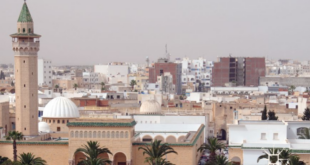TBS visited Qatar to touch base with the granddaddy of the Arab all-news satellite channels, al-Jazeera, which, at seven years of age and with much water (and a fair amount of blood) under the bridge, is in a reflective mood. A lot has changed since Al Jazeera first showed the world how different television in Arabic could be. Other Arabsats have been founded, but Adnan Sharif, Al Jazeera's interim manager, sees them more as copy cats than serious competition, imitators of what Al Jazeera pioneered in a process that Sharif describes as "the Al Jazeera effect"(see Interview with Adnan Sharif); and Al Jazeera itself continues to expand, with a new bureau opened in Kuala Lumpur, and Japan and Kenya under consideration. The channel still comes under pressure (a cameraman was arrested late September in Iraq, one of more than ten to have been detained-and later released- since the war began) but Sharif also thinks that there is "more understanding of our position." Editor-in-chief Ibrahim Helal provided an example of the mechanics of Coalition discrimination against the channel in Iraq and reporter Amr El-Kahky fleshed this out with a glimpse of how Al Jazeera, as "a channel with a reputation" was treated in the field (see Interview with Ibrahim Helal and Amr El-Kahky). Echoing Sharif's point about "the Al Jazeera effect," Yosri Fouda, the channel's London bureau chief (interviewed on a recent visit to Cairo, see Interview with Yosri Fouda), "[doesn't] assess Al Jazeera by what's on its screens but what it's forced others to have on theirs." In any event, when Hollywood puts you in the same line-up with CNN, BBC, Fox, ABC, CBS, NBC, as happened in the recent movie "The Core" (see Interview with Adnan Sharif), you know you've come a long way in those seven short years. TBS was in Qatar on October 5, 2003.
Check Also
Filling in the Blanks: New book dives into the tragedy and complexity of post-Gadhafi Libya
Since the uprisings that spread across the Arab region took hold in Libya in 2011 …
 Arab Media & Society The Arab Media Hub
Arab Media & Society The Arab Media Hub




